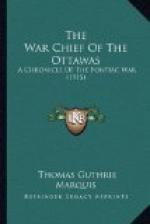The scene of hostilities now shifts to the north. Next to Detroit the most important fort on the Great Lakes west of Niagara was Michilimackinac, situated on the southern shore of the strait connecting Lakes Huron and Michigan. The officer there had supervision of the lesser forts at Sault Ste Marie, Green Bay, and St Joseph. At this time Sault Ste Marie was not occupied by troops. In the preceding winter Lieutenant Jamette had arrived to take command; but fire had broken out in his quarters and destroyed the post, and he and his men had gone back to Michilimackinac, where they still were when the Pontiac War broke out. There were two important Indian tribes in the vicinity of Michilimackinac, the Chippewas and the Ottawas. The Chippewas had populous villages on the island of Mackinaw and at Thunder Bay on Lake Huron. They had as their hunting-grounds the eastern half of the peninsula which is now the state of Michigan. The Ottawas claimed as their territory the western half of the peninsula, and their chief village was L’Arbre Croche, where the venerable Jesuit priest, Father du Jaunay, had long conducted his mission.
The Indians about Michilimackinac had never taken kindly to the new occupants of the forts in their territory. When the trader Alexander Henry arrived there in 1761, he had found them decidedly hostile. On his journey up the Ottawa he had been warned of the reception in store for him. At Michilimackinac he was waited on by a party of Chippewas headed by their chief, Minavavna, a remarkably sagacious Indian, known to the French as Le Grand Sauteur, whose village was situated at Thunder Bay. This chief addressed Henry in most eloquent words, declaring that the Chippewas were the children of the French king, who was asleep, but who would shortly awaken and destroy his enemies. The king of England, he said, had entered into no treaty with the Chippewas and had sent them no presents: they were therefore still at war with him, and until he made such concessions they must look upon the French king as their chief. ‘But,’ he continued, ’you come unarmed: sleep peacefully!’ The pipe of peace was then passed to Henry. After smoking it he bestowed on the Indians some gifts, and they filed out of his presence. Almost immediately on the departure of the Chippewas came some two hundred Ottawas demanding of Henry, and of several other British traders who were also there, ammunition, clothing, and other necessaries for their winter hunt, on credit until spring. The traders refused, and, when threatened by the Indians, they and their employees, some thirty in all, barricaded themselves in a house, and prepared to resist the demands by force of arms. Fortunately, at this critical moment word arrived of a strong British contingent that was approaching from Detroit to take over the fort, and the Ottawas hurriedly left for their villages.




